|
|
|
Sort Order |
|
|
|
Items / Page
|
|
|
|
|
|
|
| Srl | Item |
| 1 |
ID:
148546
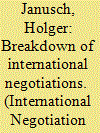

|
|
|
|
|
| Summary/Abstract |
This article examines whether the two-level game can theoretically explain negotiation breakdowns without referring to uncertainty alone. For this purpose, social conflicts are integrated in the two-level game. In this light, the classical hypothesis that smaller win-sets increase the risk of a negotiation breakdown can no longer be maintained. Instead, conflict intensity – and thereby the risk of breakdown – correlates with the intersection of the win-sets in the form of an inverted U-curve. It follows that negotiations are most likely to break down when the intersection of the win-sets is perceived as medium-sized, because the bargaining space and thereby the potential of conflict intensity is largest/highest. Furthermore, the insertion of social conflicts into the equation runs counter to the hypothesis that issue linkages facilitate international cooperation. On the contrary, issue linkages increase the risk that goal conflicts, in particular, intensify each other by spreading from one issue to another.
|
|
|
|
|
|
|
|
|
|
|
|
|
|
|
|
| 2 |
ID:
109936
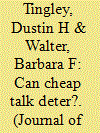

|
|
|
|
|
| Publication |
2011.
|
| Summary/Abstract |
What effect does cheap talk have on behavior in an entry-deterrence game? We shed light on this question using incentivized laboratory experiments of the strategic interaction between defenders and potential entrants. Our results suggest that cheap talk can have a substantial impact on the behavior of both the target and the speaker. By sending costless threats to potential entrants, defenders are able to deter opponents in early periods of play. Moreover, after issuing threats, defenders become more eager to fight. We offer a number of different explanations for this behavior. These results bring fresh evidence about the potential importance of costless verbal communication to the field of international relations.
|
|
|
|
|
|
|
|
|
|
|
|
|
|
|
|
| 3 |
ID:
087306
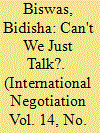

|
|
|
|
|
| Publication |
2009.
|
| Summary/Abstract |
The international community has been increasingly interested in the ways by which external actors help end civil conflicts. This study compares and contrasts the conflicts in Sri Lanka and Indonesia (Aceh) in order to understand why international intervention has failed in Sri Lanka but has been successful in Aceh. In Sri Lanka, the intensely fractured nature of domestic politics has been one of the most significant obstacles to successful peace talks. Although international intervention has become necessary to overcome the trust barriers between the two parties, it is seen as a threat to national sovereignty and therefore rejected. In contrast, the democratization process in Indonesia created new opportunities for peace. The political will of principal actors and their receptivity to external assistance enabled a peace agreement in 2005. The findings of this study show that both domestic political consensus and a supportive international environment, which protect the reputational concerns of the negotiating state, are necessary for resolving protracted ethnonational conflicts.
|
|
|
|
|
|
|
|
|
|
|
|
|
|
|
|
| 4 |
ID:
112631
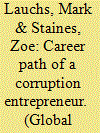

|
|
|
|
|
| Publication |
2012.
|
| Summary/Abstract |
The study of criminal career paths is necessary to understand the methods of success employed by high-performing criminals. The aim of this article is to focus on the career path of Jack Herbert who set up and maintained extensive corruption networks between organised crime groups and police in the Australian state of Queensland. This study builds on Morselli's work on the career paths of Sammy Gravano and Howard Marks that demonstrate how understanding social networks is an essential part of comprehending how organised criminals succeed. The data for this study were taken from the transcripts of the Fitzgerald Commission of Inquiry, which uncovered the extensive and resilient corruption network operated by Herbert. Herbert's relationships have been plotted to establish the nature of his operations. The findings indicate that communication of trust both allows for success and sets the boundaries of a network. Most importantly, this case study identifies Herbert's reliance on holding a monopoly as the cornerstone of his network power and position. This article adds to the literature on criminal career paths by moving away from a classic organised criminal grouping into the area of police corruption and uncovers the distinctive opportunities that this position offers the career criminal.
|
|
|
|
|
|
|
|
|
|
|
|
|
|
|
|
| 5 |
ID:
080344
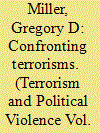

|
|
|
|
|
| Publication |
2007.
|
| Summary/Abstract |
Much of the recent debate among policymakers and in recent scholarship focuses on how states should respond to terrorism: whether they should use harsh policies to punish terrorists and thus deter future acts, or concentrate on root causes and reduce incentives to use terrorism. Often ignored in this discussion are the characteristics that distinguish terrorist groups from one another, and that influence the effectiveness of a state's actions. This article examines group motivation - national-separatism, revolution, reaction, or religion - as one key trait, and finds that these different "terrorisms" do affect the relative success of various counterterrorist policies
|
|
|
|
|
|
|
|
|
|
|
|
|
|
|
|
| 6 |
ID:
180151


|
|
|
|
|
| Summary/Abstract |
As a market for sustainability investing is growing rapidly, understanding the impact of environmental, social, and governance (ESG) activities on firms’ financial performance is becoming increasingly important. In this study, we examine the effect of ESG performance on stock returns and volatility during the financial crisis resulting from the coronavirus (COVID-19) pandemic. To quantify the impact, we use company-level daily ESG score data and United Nations Global Compact (GC) score data. In our dataset, ESG scores indicate ESG performance that is deemed important to financial materiality, and the GC score indicates the firm reputation for following UN rules. Our results indicate that during the pandemic, an increase in the ESG score, especially the E score component, is related to higher returns and lower volatility. Conversely, increasing GC scores is correlated with lower stock returns and higher volatility. In addition, we find that firms in lower return groups benefit more than other firms. Focusing on energy sector impacts, we show that although the non-energy sector benefits more than the energy sector from increasing E scores, energy sector firms can still reduce their stock price volatility by increasing these scores. Our study offers significant implications for ESG investment strategies during financial crises.
|
|
|
|
|
|
|
|
|
|
|
|
|
|
|
|
| 7 |
ID:
153719
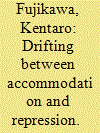

|
|
|
|
|
| Summary/Abstract |
A central government facing separatist activities adopts various policies to respond to them. In some cases, the government represses them harshly, while in other cases, it tries to accommodate the separatists’ demands. We currently have two strands in the literature to understand which policies are implemented by the government: the reputation theory and the cost-benefit calculation model. However, neither of them is sufficient to explain Indonesia's policies toward its separatists in Aceh and Papua following democratization. Indonesia's policies toward separatists have been drifting between accommodation and repression. To understand these policy shifts, this paper emphasizes the importance of the inner workings of the central government, introducing two variables: the preferences of national leaders and the existence of veto players. This paper demonstrates that these perspectives are essential in order to fully explain the Indonesian government's policies toward its separatists.
|
|
|
|
|
|
|
|
|
|
|
|
|
|
|
|
| 8 |
ID:
164655


|
|
|
|
|
| Summary/Abstract |
Dependence has been demonstrated to be a main factor driving small states’ alliance contributions. However, the causal pathway linking dependence on the one hand, and small states’ contributions on the other, is seldom explicated and assessed. Furthermore, the ways in which dependence may shape, not only drive, such contributions, have received little attention. The purpose of this article is to elaborate the role of dependence in these regards. Drawing on Glenn H. Snyder’s “fear of abandonment” concept, it is argued that reputation is the main mechanism linking dependence and contributions. The article specifies the causal pathway and assesses it against case-study evidence of Norway’s and Sweden’s military participation in ISAF. The process tracing lends much support to the proposed mechanism, and comparison helps clarify how different alliance relationship status (member or partner) impacts on the theorised causal chain.
|
|
|
|
|
|
|
|
|
|
|
|
|
|
|
|
| 9 |
ID:
088419
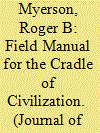

|
|
|
|
|
| Publication |
2009.
|
| Summary/Abstract |
The U.S. Army's Counterinsurgency Field Manual, Bremer's My Year in Iraq, and Xenophon's Education of Cyrus all consider problems of establishing a state. Bremer sees constitutions as fundamental, and the Field Manual emphasizes local security operations and effective governance to establish legitimacy. But Xenophon shows how states are founded by leaders with reputations for reliably rewarding supporters. Agency incentive problems in government make patronage an essential aspect of state-building, and political leaders become fundamentally constrained by their reputations. Democratic competition requires many leaders to develop independent reputations for exercising power and patronage responsibly, which can be encouraged by political decentralization.
|
|
|
|
|
|
|
|
|
|
|
|
|
|
|
|
| 10 |
ID:
146191
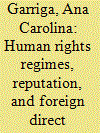

|
|
|
|
|
| Summary/Abstract |
What are the effects of international human-rights regimes on foreign direct investment (FDI)? Existing scholarship generally suggests a negative relationship between human-rights violations and FDI. Furthermore, research shows that international regimes can have effects on third parties such as non-member countries and other nonstate actors. However, it remains unclear how a country’s participation in human-rights regimes could affect investors’ decisions. I argue that host country participation in human-rights regimes provides a “reputational umbrella” for investors and therefore positively affects FDI. This effect proves stronger in countries with poor human rights records. Interestingly, investors appear not to punish human-rights violations if the state is a party to many human-rights regimes. Empirical analyses on a sample of 135 developing countries, from 1982 to 2011, provide support for the existence of these direct and indirect effects. The findings help to disentangle reputational effects from other possible causal mechanisms. Results are robust to various model specifications, including tests for endogeneity and reverse causality.
|
|
|
|
|
|
|
|
|
|
|
|
|
|
|
|
| 11 |
ID:
102512
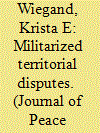

|
|
|
|
|
| Publication |
2011.
|
| Summary/Abstract |
States involved in territorial disputes are more likely initiate militarized interstate disputes to threaten or use force (MIDs) compared to states involved in other types of interstate disputes, when the disputed territory has strategic or ethnic value, and when the opposing states are contiguous, rivals, or have relative power parity. Though useful, these factors are static or rarely change over time, so they cannot explain the timing of an MID in a territorial dispute. It is not clear why a challenger state would threaten or use force at one point in the dispute, but not at another point. This study proposes that challenger states sometimes use MIDs not only to signal resolve to the opposing state in the territorial dispute, but to credibly demonstrate resolve to other adversaries in other disputes - an attempt to transfer reputation for resolve. To tackle the debate about transferability of reputation for resolve, the study empirically analyzes all territorial disputes from 1919 to 1995 and finds support that challenger states are more likely to initiate territorial MIDs as costly signals of resolve and credibility around the same time as another MID with a different adversary. Further analysis indicates that in terms of intensity level, challenger states are more likely to use threats, displays of force, or low intensity uses of force when initiating an MID to signal resolve to other states.
|
|
|
|
|
|
|
|
|
|
|
|
|
|
|
|
| 12 |
ID:
101682
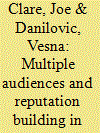

|
|
|
|
|
| Publication |
2010.
|
| Summary/Abstract |
Reputational theory of conflict behavior dates back to Schelling's seminal work on bargaining and continues to find both its advocates and critics to date. The authors do not take sides in this debate about the relevance of reputation for bargaining behavior but rather take a modified approach to reputations for resolve and probe some aspects that were largely underexplored in past research. The authors develop the argument that, if facing multiple strategic rivals and having failed in past disputes, a state has an incentive to invest in its reputation for resolute behavior by initiating and escalating conflicts. Their focus is then on both general and immediate deterrence, and while it was standard to tie reputation to a deterrer's past, the authors direct the attention to the challenger's reputation as a potential motivator for its conflictual behavior. This new focus is validated, and the related expectations supported, in the findings from their empirical analysis of strategic rivalries from 1816 to 1999.
|
|
|
|
|
|
|
|
|
|
|
|
|
|
|
|
| 13 |
ID:
165679
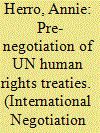

|
|
|
|
|
| Summary/Abstract |
Since 1965, nine UN human rights treaties have been adopted. Surprisingly, we know little about the conditions under which states arrived at the negotiation table because there has been no serious attempt to empirically identify the unique attributes of pre-negotiation in this context. This article examines the pre-negotiation of the UN Convention on the Rights of Persons (CRPD), drawing on diverse qualitative data sources such as interviews with state and non-state participants. Informed by a constructivist perspective, this study identifies esteem-seeking behavior as a key motivation for some states to negotiate. The article also shows how a transnational advocacy network influenced the pre-negotiation process by leveraging states’ esteem-seeking ambitions and appealing to their reputation as a way of pushing parties to negotiate. Additional tactics that the transnational advocacy network employ at the international level to expedite negotiations are also identified.
|
|
|
|
|
|
|
|
|
|
|
|
|
|
|
|
| 14 |
ID:
179163
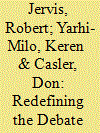

|
|
|
|
|
| Summary/Abstract |
A wave of recent scholarship has breathed new life into the study of reputation and credibility in international politics. In this review article, the authors welcome this development while offering a framework for evaluating collective progress, a series of related critiques, and a set of suggestions for future research. The article details how the books under review represent an important step toward consensus on the importance of reputation in world politics, elucidating scope conditions for when reputational inferences are likely to be most salient. The authors argue that despite the significant accomplishments of recent studies, the scholarly record remains thin on the psychology of the perceiver and is instead focused on situational factors at the expense of dispositional variables and is rather myopically oriented toward reputation for resolve to the exclusion of other important types. Despite its contributions, the new literature still falls short of a full explanation for how actors draw inferences about reputation. These remaining theoretical challenges demand scholarly attention and suggest a role for psychology in filling some of the gaps.
|
|
|
|
|
|
|
|
|
|
|
|
|
|
|
|
| 15 |
ID:
158994
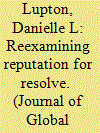

|
|
|
|
|
| Summary/Abstract |
Scholars remain conflicted over the effects of reputations for resolve on international conflict and which actors acquire these reputations. I address this debate by examining how our measures of resolve, as well as where we look for its effects, influence our conclusions about its impact on international conflict. Using data from the Archigos dataset and the International Crisis Behavior dataset, I perform a semi-parametric Cox survival analysis and directly compare the effects of resolute and irresolute behavior at two distinct levels of analysis: the leader level of analysis and the state level of analysis. My results show that target leaders who employ relatively more violent or more severe major responses to dispute triggers enjoy significantly longer periods of time before being the target of a future dispute initiated by the same challenger leader. While I also find a similar effect for target states that employ relatively more severe responses, the impact of resolute behavior at the state level of analysis does not appear to be as consistently widespread as that of resolute behavior at the leader level of analysis. My findings also show that how scholars choose to measure resolve as a concept can have important implications for their conclusions about its broader effects. Finally, my analyses present evidence that both leaders and states may be capable of acquiring reputations for resolve, opening up interesting avenues of future research.
|
|
|
|
|
|
|
|
|
|
|
|
|
|
|
|
| 16 |
ID:
117519


|
|
|
|
|
| Publication |
2012.
|
| Summary/Abstract |
In this paper, we examine how the past alliance behavior of nations affects the likelihood that these states will be involved in alliance formation. We contend that nations evaluate the reputations of potential allies when searching for alliance partners. Reputation information is processed by governments along with other immediate concerns. By introducing a model and developing subsequent measures of reputational alliance histories, we improve upon our current understanding of the factors that drive alliance formation. Using alliance reputation data derived from the ATOP project (1816-2000), we find support for the hypothesis that a reputation for upholding one's agreements significantly improves the likelihood of membership in future alliances.
|
|
|
|
|
|
|
|
|
|
|
|
|
|
|
|
| 17 |
ID:
161549
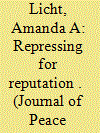

|
|
|
|
|
| Summary/Abstract |
When do leaders use repression? Leadership transitions disrupt the relationship between regime and citizens, introducing uncertainty about whether the state will use force to put down dissent. This shock to the equilibrium level of repression and dissent threatens the survival of new leaders by inviting challenges, incentivizing them to build a deterrent reputation. Investing in repression early allows a rapid re-equilibration, leading to a decrease in the probability of increased repression as a leader gains experience in office. Some leaders, therefore, have a reason to put down dissent early in their tenure to clearly establish a reputation for toughness, one that exists distinct from that of the state or the regime. These dynamics surface only for leaders that break with the prior regime. Those closely linked to the existing order can draw upon an established reputation and need not develop their own. Statistical analyses of changes in repression intensity from 1990 to 2005 reveal strong support for the argument. Breaks with the prior regime produce a short-term increase in repression, but leaders who come to power via such transitions become less likely to change the level of coercion the longer they remain in office. Leaders tied directly to the prior administration exhibit neither tendency.
|
|
|
|
|
|
|
|
|
|
|
|
|
|
|
|
| 18 |
ID:
167834


|
|
|
|
|
| Summary/Abstract |
Past studies suggest that domestic public support for compliance with international human rights law can constrain governments to comply with human rights law. But the question remains: Why does the public care about compliance? Using a series of survey experiments in South Korea and the United States, this study finds that constituents are concerned about compliance in one issue area—such as human rights—because they believe it will affect the country's reputation in other domains of international law. Cross-national survey experiments demonstrate that past noncompliance negatively affects the South Korean public's second-order beliefs about the likelihood of future compliance across different issue areas. However, past noncompliance has a limited impact on the US public's first-order beliefs across different domains.
|
|
|
|
|
|
|
|
|
|
|
|
|
|
|
|
| 19 |
ID:
127064
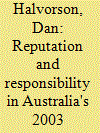

|
|
|
|
|
| Publication |
2013.
|
| Summary/Abstract |
This article reinterprets Australia's motives for its 2003 intervention in the Solomon Islands. The central argument is that considerations of Australia's international reputation have not been afforded sufficient importance in explaining the Howard government's decision to intervene. A primary concern for the Howard government was to bolster Australia's reputation in the 'War on Terror' vis-à-vis the USA and the international community more broadly by being seen to maintain order in its regional sphere of responsibility. The article establishes the historical basis for Canberra's claims to a special responsibility for the South-West Pacific region. It then demonstrates the close connection between Australia's responsibility for order in its region and the reputational norms that evolved during the early years of the War on Terror. These claims are substantiated through an analysis of the Solomon Islands crisis from June 2000 until the Regional Assistance Mission to Solomon Islands was deployed in July 2003.
|
|
|
|
|
|
|
|
|
|
|
|
|
|
|
|
| 20 |
ID:
166002
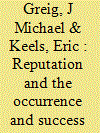

|
|
|
|
|
| Summary/Abstract |
In this article, we argue that because governments fear that accepting mediation and reaching agreements with opponents may signal weakness to other potential challengers, civil war governments tend to resist mediation as a means of demonstrating their resolve. Building on current theories of reputation in civil war, we argue that the threat of future challenges from other groups is likely to be particularly acute in states with multiple ethnic groups, especially states with high levels of ethnic exclusion. We therefore expect that civil wars in these states will be less likely to see mediation and to produce agreements when they do. By examining all instances of mediation in intrastate conflict from 1990 to 2008, we test this argument empirically and find that mediation is more likely to emerge in civil wars where there are a large number of ethnic groups, but is less likely to occur when many of those ethnic groups are excluded from the political process. Once mediation is underway, however, it is less likely to yield a negotiated settlement when there are a large number of ethnic groups, but more likely to end in a negotiated settlement when many of the ethnic groups are excluded from the political process.
|
|
|
|
|
|
|
|
|
|
|
|
|
|
|
|
|
|
|
|
|